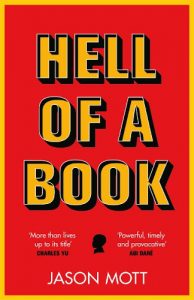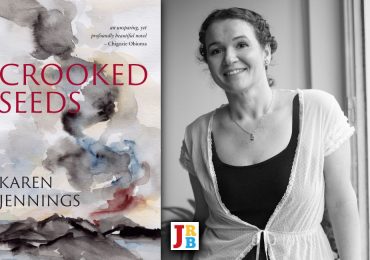Jason Mott, whose Hell of a Book was awarded the National Book Award for Fiction as well as the Sir Walter Raleigh Award for Fiction, talks to Wamuwi Mbao about writing comedy, writing grief, and the force of imagination.

Hell of a Book
Jason Mott
Hachette, 2021
Jason Mott’s extraordinary 2021 novel Hell of a Book comes at a time when the United States is entangled in an ugly battle between those who would rather erase the devastatingly cruel history of violence against Black people, and the people for whom that violence is a lived tragedy. Mott’s novel is a tremendous achievement, by turns strikingly comic and wrenchingly sad. At its centre is a writer, unnamed, who staggers through the world trying to promote his bestselling book, all the while ignoring the increasingly hallucinatory dissolution of his world. We bounce between him and a character named Soot, and the intertwining of their narratives is a crucial element of a suspenseful story that is deeply rooted in the cynical shaping of the last decade’s political and racialised climate. Hell of a Book is a work of literary virtuosity, exactly as the title promises, a dramatic and uncanny tale that jangles in the mind long after reading.
Wamuwi Mbao for The JRB: I went into this book deliberately avoiding any background—the only thing I read was the blurb on the back. I think the thing that surprised me most, from the start, was the wonderfully playful, dark comic tone you struck. Was it your intention to write a novel that draws so strongly on the absurd to shape its subject matter?
Jason Mott: Wholeheartedly! From the very beginning my goal was to write a novel that balanced extreme comedy and extreme tragedy. I have a strong belief that the best stories are the ones that can do both so, from page one, my quest was to take a reader on a journey of extreme swings and, somehow, maintain their interest.
The JRB: Hell of a Book is an incisive reflection on being a Black author in this long ongoing moment of police violence and America’s delayed reckoning with its particular history of racism. That’s a lot to story into a narrative, and yet this is a painfully lucid work of fiction. I’m interested in your sense of what it means to be an author during this interesting and difficult time.
Jason Mott: I think my feelings on being an author are similar to the feelings of most other authors: we are here to be, in some way, the conscience of society and culture. Artists of all sorts are tasked with reflecting both the beautiful and horrible parts of their societies. Artists show us what we are, whether we want to believe we’re that thing or not. Artists say the thing that we all struggle to say. That is my goal with each book: to say something that I see others around me trying to say.
The JRB: Of course, having asked that, I have to note that your protagonist goes to great lengths to avoid being drawn into thinking or (especially) feeling things about these events. I wondered if this says something about the weariness, on your part or his, to be drawn into a conversation that is being scripted on the wrong terms.
Jason Mott: Yes, it definitely reflects that. But not just for myself, but for others as well. I believe that we all tend to ‘go numb’ to the world around us. There are so many things happening and—thanks to the internet—we’re always bombarded by more tragedies. Life, sometimes, is a twenty-four hour tragedy update. So we find ourselves trying to survive by shrinking from it all. We start ignoring what we see and hear. And, to an extent, that’s necessary. But none of us can live that way forever. We have to commit to being a part of this world and, hopefully, changing it for the better.
The JRB: If you don’t mind me saying, reading Hell of a Book is an intensely filmic experience. It put me in mind of Barry Jenkins’s Moonlight, for several reasons. But I think a key note is the pacing. A lot of recent literature strikes an urgent note: what is happening, and what is to be done? Your novel sits with the problem and turns it over from various sides, and I think that meditative pacing resonates more deeply.
Jason Mott: Thank you. Much of the novel’s themes and presentation was inspired by various film genres—particularly film noir—and so that meditative quality was something I wanted to reflect for readers. The act of writing this novel was very much about me turning over this problem again and again, trying to solve it, so I wanted to pass that feeling on.
The JRB: Are there parts of this book that were harder to write than others? I think you keep the reader in this suspensive state over each chapter, because the violent event around which the narrative is circling is a bit like a whirlpool, impelling us ever closer and downward towards it.
Jason Mott: All of it was difficult for sure. But I think maintaining and controlling the balance between comedy and drama, and the balance between the present story of The Author and the story of Soot were the most difficult components. I was constantly having to think to myself ‘Have I gone too far in one direction? If so, how do I pull back and balance this so that readers don’t detach from the story?’ That was extremely challenging.
The JRB: I think that as much as the book resists being about one thing in particular, grief is definitely one of those motifs that features strongly: you have a national pageantry of grief in the wake of a violent incident that will almost certainly recur, but you also have the characters’ more personal states of anguish. Was there something you uncovered for yourself about the difficult nature of grieving?
Jason Mott: Mainly, this project reinforced something I already knew which is that grieving is not linear. It does not ‘end’. It simply fades for a time and then returns. And it will go this way again and again and again over the course of a life, and even over the course of the existence of a nation. People oftentimes seek an ‘end’ to grief. But there is no end. There are only breaks in the rain where the sun peeks through.
The JRB: There is, of course, something of an exploration of mental illness here as well, which I think is a difficult thing to draw the reader in in a way that allows us to see the shapes in the blur. Our unnamed narrator seems to be white-knuckling it, but his interaction with The Kid seems to be the catalyst that plunges him headlong into this spiralling drama.
Jason Mott: Yes, many have remarked on the mental illness component of this novel. For me, however, I mainly wanted to reflect the impact that grief and trauma can have on the imagination of a person. The imagination is the uncelebrated treasure of not only people, but of entire groups of people. How they imagine themselves is the latticework upon which they build their lives. And for The Author in the novel, his imagination has been corrupted by grief and tragedy so that, by the time we meet him, things are falling apart.
The JRB: Staying with our author-narrator, I think the choice to evacuate him as a presence, to make him into this shadow-person or outline-figure, was an interesting one. It elevates our curiosity about him, but it also allows the edges of his life to blur into those of Soot and The Kid. Did you set out to make him as evanescent as he ends up being?
Jason Mott: Yes, very much so. At one point I made him more concrete. I even gave him a name. But I immediately recognised that as a mistake because, as you said, he is a character that is an outline-figure. He is the ‘everyman’ of old, the unknown hero that descends into the depths of the underworld to slay the beast and save the community. Of course, the character doesn’t know that about himself or his role, which is part of the beauty of all heroic stories.
The JRB: Hell of a Book received the National Book Award for Fiction, and a deservedly laudatory reception from the critics. How do you feel about that?
Jason Mott: I’m still in awe of the reception and reaction that people have had to Hell of a Book. I never dared dream that it would achieve so much. This was a book I wrote for myself. It was a book I told friends no one would ever read because it was ‘doing too much and it’s too weird’. So imagine my surprise to have the book be where it is now. I’m stunned, and elated.
The JRB: It can seem at times that telling the long story in which this novel is immersed is a bit of a Sisyphean task. What were your feelings when you finished this book?
Jason Mott: Honestly, I was thrilled, but also terrified. As I said, as much as I was proud of what I had done writing the book, I didn’t think there would ever be an audience for it. I imagined it as a book that I would write, find a home for, and then move on from. It was a book that would only ever exist on the hard drive of my computer and in the minds of a select few friends who helped give me feedback on it, but that’s all. So, upon finishing, I was the saddest happy person around.
- Editorial Advisory Panel member Wamuwi Mbao is an essayist, cultural critic and academic at Stellenbosch University. Follow him on Twitter.





